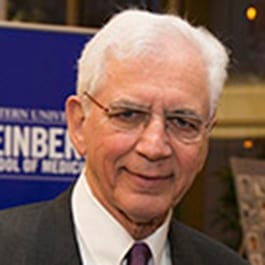Biography
 I grew up in Toledo, Ohio, the son of immigrant parents. I graduated from Toledo university in 2 years and then joined Northwestern University Medical School, took my residency at Passavant Memorial Hospital, and held a Gynecologic oncology fellowship at New York Medical College. This was followed by US Army service at the 97th General Hospital, in Frankfurt, Germany. I returned to Chicago to join my brother, Albert and Dr. Ralph Reis in private practice at Passavant Memorial Hospital where I began my academic career. During my career, I was director of the Colposcopy Clinics at Prentice Woman’s Hospital, served as a senior oral examiner for the American Board of Obstetrics and Gynecology and as president of the Chicago Gynecological Society, the Central Association of Obstetricians and Gynecologists, and a member of the Executive Board of the Society of Gynecologic Surgeons. I became the George Gardner Professor of Gynecology, Chief of Gynecology at the Feinberg School of Medicine, Northwestern University and Northwestern Memorial Hospital.
I grew up in Toledo, Ohio, the son of immigrant parents. I graduated from Toledo university in 2 years and then joined Northwestern University Medical School, took my residency at Passavant Memorial Hospital, and held a Gynecologic oncology fellowship at New York Medical College. This was followed by US Army service at the 97th General Hospital, in Frankfurt, Germany. I returned to Chicago to join my brother, Albert and Dr. Ralph Reis in private practice at Passavant Memorial Hospital where I began my academic career. During my career, I was director of the Colposcopy Clinics at Prentice Woman’s Hospital, served as a senior oral examiner for the American Board of Obstetrics and Gynecology and as president of the Chicago Gynecological Society, the Central Association of Obstetricians and Gynecologists, and a member of the Executive Board of the Society of Gynecologic Surgeons. I became the George Gardner Professor of Gynecology, Chief of Gynecology at the Feinberg School of Medicine, Northwestern University and Northwestern Memorial Hospital.
My publications and research centered on gynecologic cancer, particularly pre-malignant conditions of the cervix.
I served a 3-year term on the Board of Beth Emet Synagogue in Evanston. Since retirement in 2012, I continued my interest in the HPV vaccine and extended this to other adult vaccines including Tdap, Herpes Zoster, and Pertussis. In 2013 I co-authored Vaccine Handbook, A Guide for Residents and in 2017 co-authored The Vaccine Handbook. I served as a volunteer physician at the Community Health Clinic on the west side of Chicago, lectured to third-year medical students at the Feinberg School of Medicine and was a consultant to Gynecologic Surgical residents at Prentice Women’s Hospital until 2017. I am currently assisting the Oncology Services at Feinberg School of Medicine in instituting a program to initiate vaccinations of new as well as continuing cancer patients since these adults are at significant risk because of their diminished immunologic response to infections, both from the condition and from the various treatments (surgery, radiation, chemotherapy). I also serve on the Admissions Committee of Feinberg School of Medicine.
